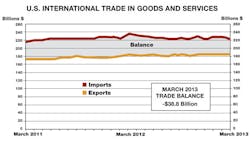With a drop in imports from China leading the way, the U.S. trade deficit in March fell to $38.8 billion, down from a revised $43.6 billion in February.
Imports from China declined by $5.5 billion in March. “The surge correction comes atop of a surge in February, and may be related to the timing of the Lunar New Year celebrations in China,” noted Michael Dolega, an economist with TD Economics. Dolega said the rising renminbi would likely “continue to put downward pressure on Chinese imports.”
The goods deficit decreased $4.6 billion from February to $56.1 billion. Exports of goods decreased $1.8 billion while the import of goods fell $6.4 billion.
NAM Chief Economist Chad Moutray, in the Shopfloor blog, observed that the narrowing goods deficit was due “mostly to non-petroleum factors.” For the first three months of 2013, the U.S. has imported just over 868 million barrels of oil, compared to over 960 million in the same period in 2012.
In March, the biggest declines in exports of goods occurred in food, feed and beverages ($1.1 billion); automotive vehicles and parts ($0.3 billion); capital goods ($0.3 billion); and consumer goods ($0.3 billion).
The decrease in the import of goods was led by drops in consumer goods ($3.4 billion); capital goods ($1.5 billion) and industrial supplies and materials ($1.4 billion).
March exports of advanced technology products grew $4.9 billion, while imports also grew by $3.4 billion. The total deficit in these products fell to $3.4 billion from $5 billion in February.
The trade deficit in goods with China fell to $17.9 billion in March, while the deficit with the European Union grew $1.1 billion to $9.9 billion and the deficit with Mexico increased $1 billion. Goods surpluses were registered with Hong Kong ($3.2 billion); Brazil ($1.7 billion) and Australia ($1.3 billion).
Looking ahead, TD Economics’ Dolega said U.S. exports have become increasingly competitive and this should improve the U.S. trade deficit in the future. “However, much of this won’t be seen until the current weak global economic backdrop improve," he cautioned.
About the Author
Steve Minter
Steve Minter, Executive Editor
Focus: Leadership, Global Economy, Energy
Call: 216-931-9281
Follow on Twitter: @SgMinterIW
An award-winning editor, Executive Editor Steve Minter covers leadership, global economic and trade issues and energy, tackling subject matter ranging from CEO profiles and leadership theories to economic trends and energy policy. As well, he supervises content development for editorial products including the magazine, IndustryWeek.com, research and information products, and conferences.
Before joining the IW staff, Steve was publisher and editorial director of Penton Media’s EHS Today, where he was instrumental in the development of the Champions of Safety and America’s Safest Companies recognition programs.
Steve received his B.A. in English from Oberlin College. He is married and has two adult children.
